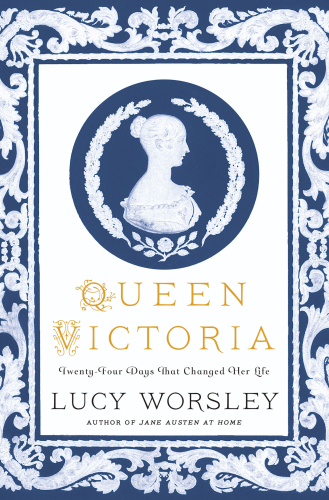
Queen Victoria - Twenty-Four Days That Changed Her Life
- اطلاعات
- نقد و بررسی
- دیدگاه کاربران
نقد و بررسی

November 15, 2018
The Chief Curator of Historic Royal Palaces in England shares her unique access to the quotidian history of English royals to treat us to another delightful story from the inside.Worsley (Jane Austen at Home, 2017, etc.) is helped in this instance by Victoria's penchant for saving outfits she wore at important milestones, right down to the shoes, and the author provides significant insight into her attitude to the throne. At first, she was a headstrong young woman trying to break away from the influence of her mother and John Conroy. Her father's friend and servant, Conroy devised a system that he and Victoria's mother used to control all aspects of her life. It was a system designed to ensure their power when she ascended the throne, whether as regents or advisers. Luckily, Victoria was sufficiently headstrong to reject them both. As queen, she relied on Lord Melbourne, a father figure, for advice, and she exhibited her strong emotional intelligence. After her marriage to Albert, she fell under his orderly, dispassionate intellect; luckily, she retained the empathy that made her beloved. Still, he often infantilized her, downplaying her abilities. As a mother, Victoria came up short, as Worsley amply shows. She didn't enjoy her children except that they made Albert happy. She was tyrannical and never nursed them, since that would have made her feel "like a cow or a dog." Albert's influence was reflected in her thinking that women were inferior to men and therefore had no right to vote. She held him up as the unattainable perfection that none of her children would ever attain. Her grief at Albert's death and interminable mourning are legendary, but it also made her realize that no one could have mastery over her. John Brown caused no end of consternation, but it was he who brought her back to the people. She made few public appearances, but photographs and two books she wrote about Albert took the place of her presence.An utterly enjoyable account of Victoria's familial relationships.
COPYRIGHT(2018) Kirkus Reviews, ALL RIGHTS RESERVED.

December 1, 2018
Historian Worsley (Jane Austen at Home: A Biography) presents a unique account of Queen Victoria, focusing on 24 of the most important days of her life using research based on correspondence as well as previously published books and articles. Among the days covered are Victoria's birth at Kensington Palace in 1819, her ascension to the throne in 1837, her coronation in 1838, her marriage to Prince Albert in 1840, the Prince's death in 1861, and Victoria's death in 1901. In addition to providing insight on these specific events, Worsley gives historical background on Victoria's family, including the betrothal of her son Edward VII to Alexandra of Denmark and the complex relationship between Victoria and her own mother, Princess Victoria. Worsley also looks closely at court etiquette, customs, and family dynamics, and reconsiders Victoria's long-standing relationship with servant John Brown. VERDICT Fans of biography and history, especially related to British history should find this fascinating reading. Those interested in Queen Victoria will find this to be a wonderful addition to the literature.--Lucy Heckman, St. John's Univ. Lib., Queens, NY
Copyright 2018 Library Journal, LLC Used with permission.

December 1, 2018
Until very recently, Queen Victoria held the distinction of being the longest-reigning monarch in British history, holding the throne from 1837 to 1901, hence the nineteenth century retaining the label the Victorian era. Historian and author Worsley (If Walls Could Talk, 2012) puts forth intriguing major points in this new assessment, substantiated by extensive research and supported by copious reading of secondary sources. She emphasizes Victoria's particular style of governing, which she describes as a clever way . . . that we might characterize as stereotypically feminine; the shadow cast over her by her husband, Prince Albert; and how she emerged from his domination upon his early death as imperious, eccentric and really rather magnificent. What may come as a surprise to many readers and students of Victorian history is Worsley's assertion that Queen Victoria, in truth, led a life that was not particularly happy. A replacement for previous biographies? No, but this is unquestionably a helpful, thoughtful addition to the ever-growing body of work about this century-defining ruler.(Reprinted with permission of Booklist, copyright 2018, American Library Association.)




دیدگاه کاربران